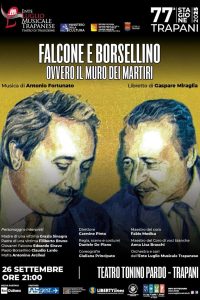opera in music and prose, starring
Vito Cesaro, actor (Falcone)
Claudio Lardo, actor (Borsellino)
Grazia Sinagra, soprano (Mother)
Filiberto Bruno, baritone (Father)
Antonino Arcilesi, bass (Mafia)
music by
Antonio Fortunato
libretto by
Gaspare Miraglia
orchestra & chorus
Luglio Musicale Trapanese
chorus master
Fabio Modica
children’s choir master
Anna Lisa Braschi
sets, costumes & lighting
Daniele De Plano
stage director
Martina Mazzola
assistant conductors
Luigi Fiore e Mirco Reina
production
Luglio Musicale Trapanese
conductor
Carmine Pinto
directed by
Daniele De Plano
To enter the theatre this evening means stepping into a place of memory and of shared emotion. You will not find a set that seeks to imitate reality; rather, a symbolic space, a landscape of the soul that guides us to the heart of those terrible and unforgettable days.
I have conceived Falcone and Borsellino as an oratorio. At its heart lies the word set to music, amplified by the collective voice and entrusted to the imagination of the audience. Traditionally, the oratorio recounted biblical or religious stories, assigning to the chorus the role of the community’s voice: to comment, to echo, and to bear witness to the events narrated by the soloists. It is no coincidence that, across the centuries, the oratorio has also become a space where music preserves civic memory, bears testimony, and meditates on the destiny of humankind.
On stage rises a structure reminiscent of the Greek theatre, the ancient cradle of dialogue between man and fate, between the individual and the community. It is there that the chorus gives voice—adults alongside children: a chorus that comments, questions, consoles. The pure voices of children intertwine with the more mature ones, reminding us that memory does not belong only to the past, but lives on and renews itself in the future.
At the side of the stage stands a white tree. Its broken branches are scars, lives interrupted, names we cannot forget. But that tree is not only a wound: it is also root, the fragile yet powerful image of an Italy that, despite everything, resists and blossoms again.
In the background, a wall: the Wall of the Martyrs, from which this work draws its strength. Around the broken branches, five young dancers—students of the Choreutic High School of the City of Trapani—embody in movement what words cannot always say: fear and courage, silence and outcry, fragility and hope. Through dance, the story of the protagonists and of the music finds its counterpart in gesture, transforming tragedy into a poetic act that belongs to us all.
This performance does not aim to be a lesson, but an encounter. An act of love and gratitude toward Giovanni Falcone and Paolo Borsellino, who, through their lives, taught us that justice and dignity are never given, but are a daily choice.
May the theatre tonight become an embrace: a place where we remember, but also dream together of the possibility of a different future—free and peaceful.
Director’s Notes by Daniele De Plano

Trapani, Teatro "M° Tonino Pardo"
@ Conservatorio di Musica "A. Scontrino"
September 26th, 2025

 Italiano
Italiano